I Want a Service Dog! Don't I?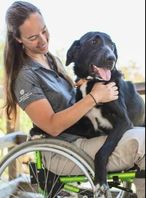 At least once a week there is a story in the news or on social media about service dogs. But even with all this attention, you still may find yourself with questions about service dogs. The first bit of confusion comes from the seemingly simple question: What exactly is a service dog?Let's start with some definitions: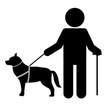 A service dog is defined as a dog trained to do tasks to mitigate a person’s disability. A service dog is partnered with only one person, and that person must have a documented disability; as long as the dog is trained, the person can take the service dog to any public place where the disabled partner needs help. Only dogs may be service animals; with very few exceptions, animals of other species are not allowed in public places. 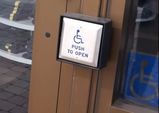 A dog can be trained to push a button like this for his disabled partner A dog can be trained to push a button like this for his disabled partner Public place, in the context of service dogs, refers to anywhere in the community people are generally allowed to visit, such as retail and grocery stores, movie theaters, restaurants, public transportation, libraries, concert venues, community events, hospitals, etc. Tasks that service dogs are trained to do could include alerting a deaf person to a sound, pushing automatic door buttons for someone who can't reach, guiding a blind person to find an exit, etc.  A therapy animal provides comfort for people other than his owner. Therapy animals go to places like nursing homes, hospitals, and schools, visiting patients and other people who are going through stressful times. Therapy animals are only allowed to go where they are invited to go; they are not allowed in public places unless by invitation. Therapy animals are usually dogs, but may also be other species, including cats, rabbits, guinea pigs, horses, etc.  An emotional support animal is one who is deemed medically necessary to help an individual with a psychological or emotional disability, at home or on airplanes. Individuals are not allowed to bring emotional support animals to public places, but individuals are allowed to keep the animals in “no pets” housing without paying pet fees. Emotional support animals can be almost any species of pets, including dogs, cats, rodents, lizards, birds, etc. Some individuals with disabilities are allowed to bring their emotional support animals in the cabins on airplanes, though airlines are beginning to place restrictions on which species are allowed. Does that help clarify things? Let's get back to the service dogs! What can a service dog do for me?The legal purpose of a service dog is to help a disabled person mitigate his/her disability, thus increasing independence! Do you have a disability and are having trouble trying to figure out what a service dog can do for you? Try this: 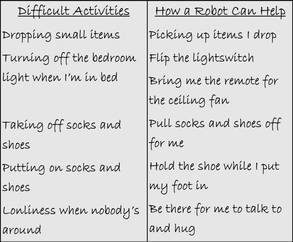 Divide a piece of paper into two columns. In the first column, write down activities that you have difficulty doing because of your disability. Consider especially activities that you do daily or weekly, as these will have the most impact on your independence and quality of life.  In the second column, imagine you have a rudimentary robot and you can program him to follow voice commands. What could you program him to do? Don’t think about an adorable little dog just yet; try to focus just on the tasks.
Be as specific as possible when deciding what tasks you need a dog trained to do. "Helping me when I have a seizure" is not specific enough; "Retrieving my bag of medicine off the counter so I can take my medicine right after a seizure" IS a specific task that can be trained. Teddy Bear Tasks require no training so they are not considered service dog tasks, so cross them out on your list. If all the tasks on your list are Teddy Bear Tasks, then you legally do not qualify for a service dog. You may, however, benefit from an emotional support animal, or even a well behaved pet dog!  Now that you have a task list, it’s time to carefully consider whether you want to train your service dog to work in public. Though you may be legally allowed to take a service dog in public, training the dog to be able to handle all public situations can be very time-consuming and labor-intensive; training for public work requires the help of a very experienced professional. In-home service dogs can be just as necessary and life-saving as public trained service dogs, but with significantly less investment in time and cost. We'll talk more about the laws surrounding public work in Service Dog Training: Part 3! Only after you have a clear idea of what a service dog will need to be trained to do for you, should you begin looking for a dog! Most people have these options:
2 Comments
6/9/2021 04:34:24 am
The learning space is part of what makes a student learn more. If you are in learning space that will allow you to be the best version of yourself, then that is a win already. I do hope that we all are able to give our children the best learning space. If you ask me, we need to make sure that our children's learning space a lot more better. I will tell you that, because I am part of an exceptional program myself.
Reply
TROY MITCHUM
11/19/2021 08:42:46 pm
I want full medical/emotional service dog training to my CONDITIONS!. 5 MONTH OLD German Rottweiler male?? Ready for delivery an live at academy until ALL TRAINING COMPLETE. WITH Registered ID CARD. CERTIFIED WITH HIS PICTURE. CALL ME ASAP FOR FULL PRICE FOR THIS TYPE SERVICE? 678-608-9509 TROY MITCHUM
Reply
Leave a Reply. |
AuthorElizabeth Morgan specializes in training service dogs as the trainer and owner of Alabama Dog Academy. Archives
January 2024
Categories |
|
256-434-1747 (call or text)
[email protected] |
Proudly powered by Weebly



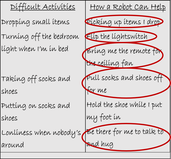
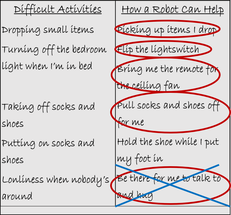

 RSS Feed
RSS Feed


